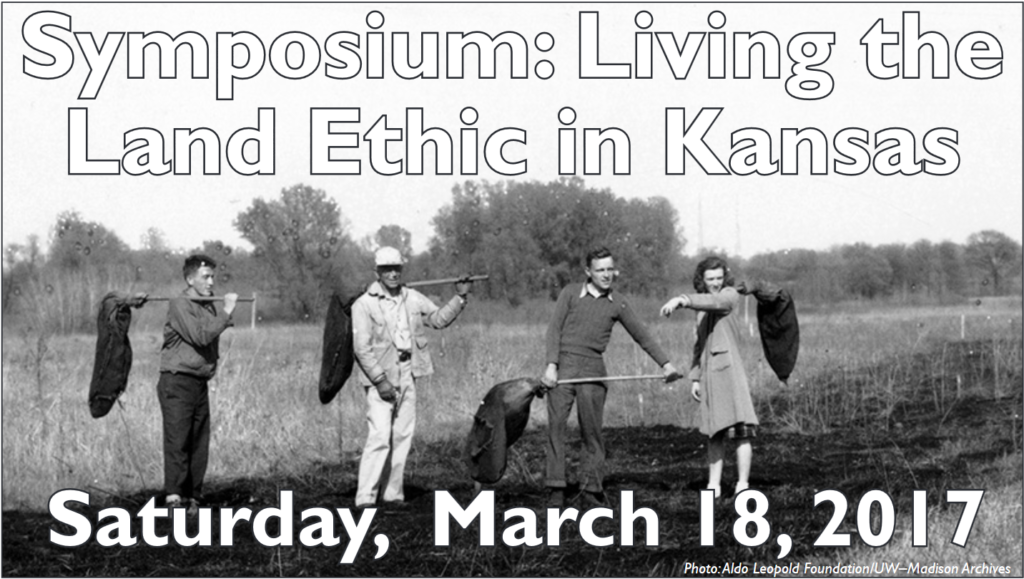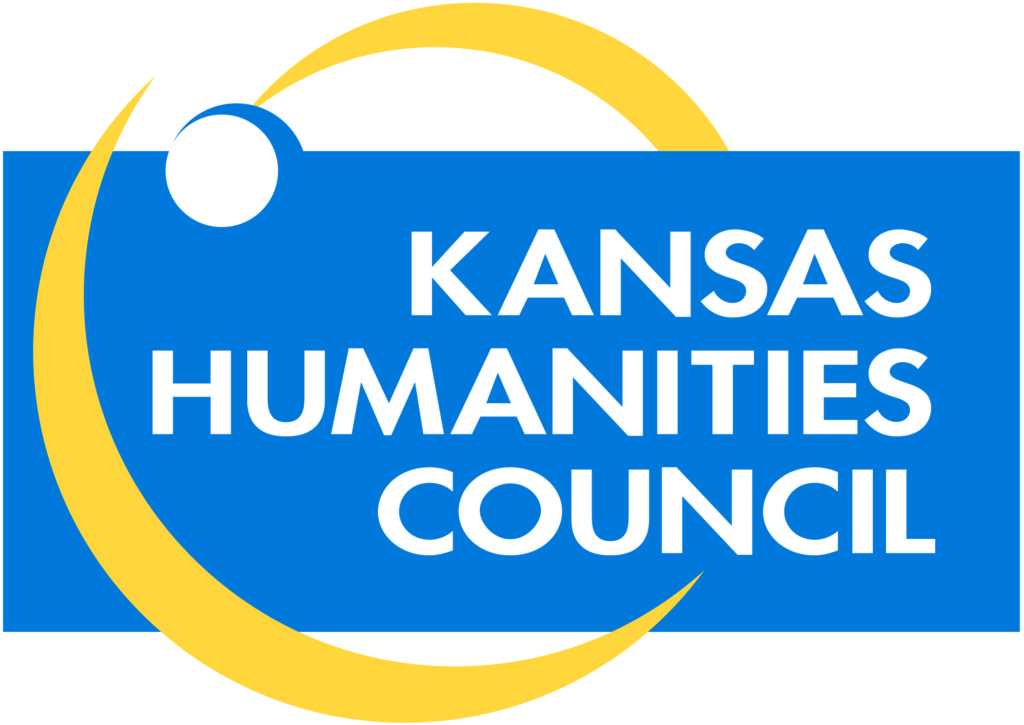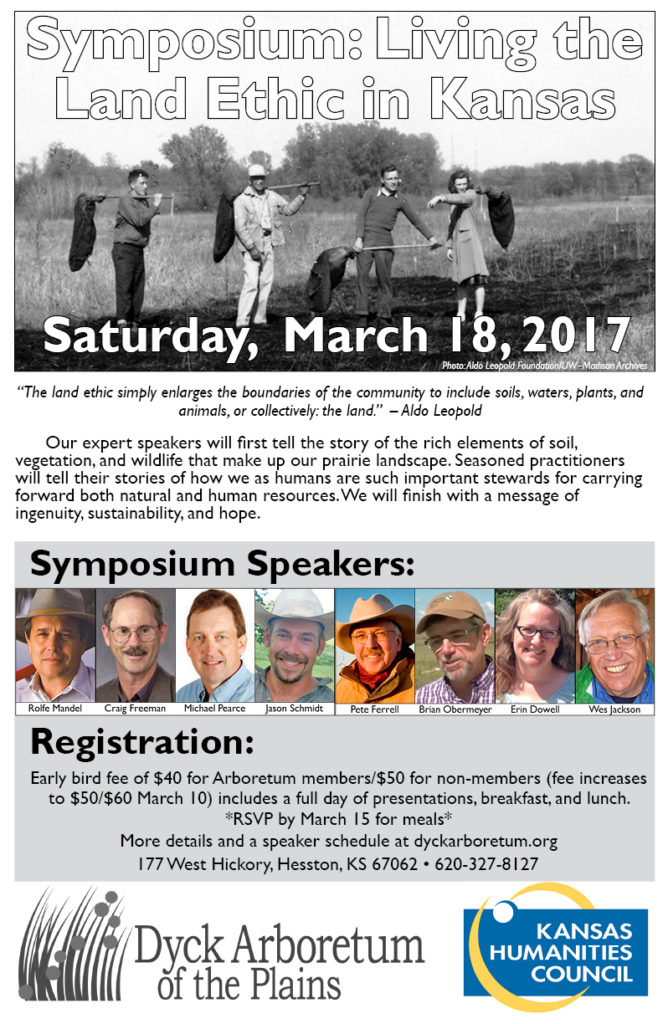
Spring Symposium: Living the Land Ethic in Kansas
March 18th, 2017 - 8:00am - 12:00am
Dyck Arboretum of the Plains
177 West Hickory
Hesston, KS 67062
Get Directions
Saturday, March 18, 2017, 8:30 a.m. to 4:15 p.m.
“The land ethic simply enlarges the boundaries of the community to include soils, waters, plants, and animals, or collectively: the land.” – Aldo Leopold
Symposium Goals
- Introduce the concept of Leopold’s Land Ethic
- Learn more about the elemental prairie resources of soils, vegetation, and wildlife that shape our Kansas economy and identity
- Find inspiration from the practitioners who steward our Kansas natural and human resources
- Hear a message of hope for how to be better stewards in the future
Symposium Summary
Collectively, “the land” in Kansas represents an immense array of natural resources for which we are very fortunate to be temporary stewards. Appreciating the value of these resources, educating ourselves about their complexities and vulnerabilities, learning how to be good caretakers, and making it a priority to pass them along in good shape to our children and grandchildren should be important to all Kansans.
Aldo Leopold’s Land Ethic writings in A Sand County Almanac implored us as people to make deep connections with the soil, plants, and animals of our respective natural landscapes. In Kansas, our food, economy, and recreation are closely connected to the prairie. Agricultural production thrives here thanks to a heritage of deep prairie soils. Ranching provides a sustainable way to make a living on the most extensive remaining acreages of tallgrass prairie left in the United States. Birding, photography, and hunting of prairie wildlife provide popular, income-producing recreation. The prairie soils, vegetation and wildlife of Kansas are critically important to our sustenance and identity as people. We conserve these natural resources for survival in the moment, but also as conservation stewards that will benefit future generations. As prairie people, we connect with the land, build a sense of place, and live out the land ethic that Leopold sought.
Our expert speakers will first tell the story of the rich elements of soil, vegetation, and wildlife that make up our prairie landscape. Then, seasoned practitioners will tell their stories of how we as humans are such important stewards for carrying forward both natural and human resources. We will finish with a message of ingenuity, sustainability, and hope as we listen to voices of the past and future.
Symposium Schedule
- 8:00 – 8:30 a.m.: Continental breakfast (rolls, coffee, fruit)
- 8:30 – 8:45: Introduction to Symposium/Introduction to Aldo Leopold’s Land Ethic (Brad Guhr)
Documenting and Helping Us Appreciate the Prairie Elements
- 8:45 – 9:30: Prairie Soils – Rolfe Mandel (Archeology/Soils Professor, Kansas University – “Prairie Soils in the Context of the Anthropocene” – The Anthropocene has recently been proposed as a new geological epoch, in which human activities have modified the natural landscape. I will explain how organic-rich prairie soils, which collectively form a vital component of the Great Plains landscape, have been directly and indirectly affected by cultivation since the onset of the Anthropocene.)
- 9:30 – 10:15: Prairie Vegetation – Craig Freeman (Botanist/Herbarim Curator, Kansas Biological Survey – “A Primer on their Floristic Cogs and Wheels” – Encompassing parts of all the major grassland ecosystems of the Great Plains, Kansas contains a rich tapestry of prairie types comprising more than a thousand species of flowering plants. We will examine these prairies through a vegetational lens to see how they came to dominate central North America, how they vary across the landscape, and to highlight their floristic features.)
- 10:15 – 10:30: BREAK
- 10:30 – 11:15: Prairie Wildlife – Michael Pearce (Wildlife Photographer/Sportsman, Wichita Eagle – “The Simple Complexity of Wildlife in Kansas- Learning from the past, living in the present, praying for the future.”)
Living A Land Ethic
- 11:15 – noon: Agricultural Steward of Soil and Water – Jason Schmidt (Dairy Farmer, Flint Hills Land Steward – A young farmer’s ongoing journey to advance toward ecological and economic sustainability. A story of what happens when a philosophical quest for environmental stewardship meets the current reality of agriculture in Kansas.)
- noon – 1:00 p.m.: Lunch (Menu: venison stew (gluten free), tossed salad, whole grain bread, fruit cobbler (peach, mixed berry, cherry) with ice cream, lemon water and coffee/hot tea)
- 1:00 – 1:45: Ranching Steward of the Prairie – Pete Ferrell (Rotational Grazing Rancher, Flint Hills Land Steward -“Dances with Hooves: The Perils of Domestication” – Tallgrass Prairie is the resilient offspring of an ancient marriage of plants and animals. Honoring that sacred union, I strive to nurture an ecology and economy that benefits both biotic members. I will share my struggles to balance my need to derive a livelihood in a profession (agriculture) that thrives on domestication and my desire to preserve the ecology of this place.)
- 1:45 – 2:30: Connecting People and the Land – Brian Obermeyer (Flint Hills Program Manager, The Nature Conservancy)
- 2:30 – 2:45: BREAK
- 2:45 – 3:30: Instilling the Land Ethic in Our Children – Erin Dowell (Earth Partnership for Schools Teacher, Peterson Elementary – Wichita – Tomorrow’s land stewards are in our schools and being raised in our homes today. Are children today learning what they need to know to be tomorrow’s conservationists, environmentalists, scientists, artists? Are we inviting them to be a part of the land, right now, or are we waiting until they’re bigger? I’ll share how my Kansas roots brought about my land ethic, how that ethic drives my teaching, and how the creation of a small prairie restoration space is inspiring tomorrow’s land stewards, one muddy hand at a time.)
- 3:30 – 4:15: A Land Ethic for the Future – Wes Jackson (Founder of The Land Institute – “A Land Ethic for the Future” – Inspired by the likes of ecologists Aldo Leopold and J. Stan Row, genetics and plant breeding, ecology, evolutionary biology, soil science, plant pathology and modern computational power are now being combined at The Land Institute and elsewhere to meet the goal of solving the 10,000 year old problem OF agriculture. A paradigm shift is now in the cards making it now imaginable to see the end of annual grain production, soil erosion, fossil fuel dependency, chemical contamination of land and water. Perennial grains alone represent new “hardware,” but when grown in mixtures, for the first time ecology and evolutionary biology can enter the management of grain production in a major way. The global distribution of Land Institute scientists’ germplasm is now being grown by their colleagues in Asia, Africa, Australia, Latin America, Europe, as well as North America. We can begin to imagine an agriculture based on the principles of nature’s ecosystems.)
Registration
Early bird fee of $40 for Arboretum members/$50 for non-members (fee increases to $50/$60 March 10) includes a full day of presentations, breakfast, and lunch. To register, contact the Dyck Arboretum at 620-327-8127 / 177 W. Hickory, Hesston, KS or arboretum@hesston.edu.
*RSVP BY WEDNESDAY, MARCH 15, TO BE INCLUDED IN MEAL COUNT.*
Underwritten by: Kansas Humanities Council and Dyck Arboretum of the Plains






